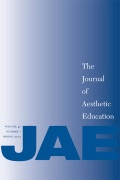
JOURNAL OF AESTHETIC EDUCATION
Scope & Guideline
Enhancing Educational Journeys with Aesthetic Perspectives
Introduction
Aims and Scopes
- Aesthetic Education and Pedagogy:
The journal prioritizes research that explores methods and theories related to teaching and learning through the arts, advocating for an educational framework that values aesthetic experiences as integral to personal and intellectual development. - Interdisciplinary Approaches:
It supports interdisciplinary studies that connect aesthetics with various fields such as philosophy, cognitive science, and cultural studies, encouraging diverse methodologies in investigating aesthetic phenomena. - Cultural and Historical Perspectives:
The journal examines the historical and cultural dimensions of aesthetic education, focusing on how different contexts influence educational practices and artistic expressions. - Critical Theory and Aesthetic Normativity:
It engages with critical theories related to aesthetics and their implications for educational practices, questioning normative assumptions and exploring the role of art in shaping ethical and moral perspectives. - Experiential Learning through the Arts:
Research highlighting experiential and participatory learning through artistic practices is central, emphasizing the importance of hands-on engagement with art as a means of fostering deeper understanding and appreciation.
Trending and Emerging
- Aesthetic Experience and Emotional Learning:
Recent publications emphasize the connection between aesthetic experiences and emotional learning, highlighting how engagement with art can foster emotional intelligence and empathy in educational settings. - Critical Pedagogy and Social Justice:
There is a growing trend towards integrating critical pedagogy with aesthetic education, exploring how art can serve as a tool for social justice and transformative learning in diverse contexts. - Digital and Media Arts in Education:
The incorporation of digital and media arts into aesthetic education is gaining traction, reflecting the impact of technology on artistic practice and learning processes. - Cross-Cultural Perspectives:
Research focusing on cross-cultural comparisons and the global dimensions of aesthetic education is on the rise, fostering a more inclusive understanding of art and education. - Narrative and Storytelling in Aesthetic Education:
An emerging theme is the use of narrative and storytelling as pedagogical tools, exploring how these methods can facilitate deeper learning and engagement with aesthetic content.
Declining or Waning
- Traditional Aesthetic Theories:
There appears to be a waning interest in traditional aesthetic theories that do not integrate contemporary critical perspectives. The journal is moving towards more dynamic and context-sensitive explorations of aesthetics. - Purely Historical Studies of Art:
Research that solely focuses on historical accounts of art without connecting to modern educational practices or theories is less frequently published, indicating a preference for studies that link history with current educational relevance. - Narrowly Defined Artistic Disciplines:
The examination of specific artistic disciplines in isolation is declining, as the journal increasingly favors interdisciplinary studies that encompass broader aesthetic experiences rather than focusing on individual art forms. - Overly Technical Aesthetic Evaluations:
There is a noticeable decrease in papers that engage in overly technical or formal evaluations of aesthetic works without considering the educational implications or experiential aspects. - Aesthetic Experience as a Sole Focus:
The journal is shifting away from discussions that treat aesthetic experience as an isolated phenomenon, moving towards integrating these experiences within broader educational and ethical frameworks.
Similar Journals
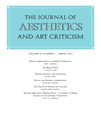
JOURNAL OF AESTHETICS AND ART CRITICISM
Connecting Minds Through Art and PhilosophyThe Journal of Aesthetics and Art Criticism, published by Oxford University Press, stands as a premier platform for scholarly discourse in the realms of music, philosophy, and the visual and performing arts. Established in 1996 and continuing through 2024, this journal has achieved remarkable recognition, being ranked in the Q1 category across several disciplines, and securing prestigious positions in various Scopus rankings: 29th in Music, 50th in Visual Arts and Performing Arts, and 151st in Philosophy, showcasing its essential contribution to arts and humanities scholarship. While not an open-access journal, its rich repository of articles offers invaluable insights for researchers, professionals, and students alike, fostering a deeper understanding of aesthetics and critical theory. The journal's commitment to interdisciplinary approaches opens pathways for innovative dialogue, making it an indispensable resource for anyone engaged in the study and appreciation of the arts.

Journal of Mathematics and the Arts
Fostering Innovation at the Intersection of Art and MathThe Journal of Mathematics and the Arts, published by Taylor & Francis Ltd, is a unique interdisciplinary journal that explores the rich intersection of mathematics and artistic expressions, providing a platform for researchers, professionals, and students alike. With an ISSN of 1751-3472 and an E-ISSN of 1751-3480, this journal has been an important resource since its inception in 2007 and continues to expand its reach through 2024. The journal is particularly noteworthy for its Q1 ranking in Visual Arts and Performing Arts among the 2023 category quartiles, reflecting its impact in this creative area, although it holds a Q4 ranking in Computer Graphics and Computer-Aided Design and Mathematics (miscellaneous), showcasing its broader mathematical exploration. While it currently does not offer open access options, its rigorous peer-review process ensures the publication of high-quality research that contributes to the academic discourse on the aesthetic dimensions of mathematical concepts. With a focus on fostering collaboration between the arts and sciences, this journal stands as a vital hub for innovative thought and practice, making it essential reading for those invested in the evolving dialogue between these dynamic fields.

Open Philosophy
Fostering Discourse, Democratizing Knowledge.Open Philosophy, published by DE GRUYTER POLAND SP Z O O, is a premier open-access journal that has been fostering scholarly discourse in the realm of philosophy since its inception in 2018. Operating out of Germany, this journal has gained significant traction, now ranking in the Q2 category for philosophy with a commendable 80th percentile in Scopus, positioning it among the top 20% of journals in its field. With a dedicated focus on illuminating philosophical discourse, Open Philosophy provides a platform for innovative research and critical engagement, catering to the needs of researchers, professionals, and students alike. Its commitment to open access ensures that cutting-edge philosophical ideas are readily available to a global audience, contributing to the democratization of knowledge in the discipline. The journal's dimensions encompass a broad spectrum of topics within philosophy, seeking to expand theoretical frameworks and discussions from 2018 through to 2024 and beyond. Discover the transformative power of philosophical inquiry with Open Philosophy, where ideas flourish in an accessible and inclusive academic environment.
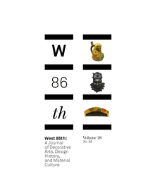
West 86th-A Journal of Decorative Arts Design History and Material Culture
Fostering Dialogue on Material Culture's SignificanceWest 86th: A Journal of Decorative Arts, Design History, and Material Culture, published by University of Chicago Press, stands as a significant publication within the arts and humanities, particularly focusing on the interconnections among decorative arts, design history, and material culture. With its ISSN 2153-5531 and E-ISSN 2153-5558, this journal has evolved since its inception in 2011, diligently contributing to a deeper understanding of visual arts and their historical context. Although categorized in the fourth quartile for the year 2023 within Visual Arts and Performing Arts, it ranks #387 out of 667 in Scopus, showcasing a unique niche with a commitment to quality scholarship. Researchers, professionals, and students engaged in these dynamic fields are encouraged to explore this journal as it provides insightful analyses and discussions that enrich the dialogue on the significance and impact of material culture. While it is not open access, the journal’s contributions remain integral for those seeking to deepen their knowledge and appreciation of decorative arts and design history.

Paideusis-The Journal of the Canadian Philosophy of Education Society
Igniting Philosophical Conversations in AcademiaPaideusis - The Journal of the Canadian Philosophy of Education Society serves as a vital platform for scholarly discussion and inquiry within the field of philosophy of education. Published by the Canadian Philosophy of Education Society (CPES) and embracing an Open Access model since 1987, this journal fosters an inclusive environment for researchers, educators, and students seeking to engage with contemporary educational theories and practices. With an emphasis on philosophical reflection and critical analysis, Paideusis invites contributions that challenge and extend our understanding of educational paradigms, making it a crucial resource for those committed to advancing discourse in education. The journal not only aims to promote intellectual engagement but also to cultivate a community where new ideas can flourish, ultimately shaping the future of educational thought and practice.

Lebenswelt-Aesthetics and Philosophy of Experience
Advancing Knowledge at the Intersection of Experience and AestheticsLebenswelt-Aesthetics and Philosophy of Experience is a distinguished academic journal published by Milano University Press, located in the heart of Italy. With a commitment to fostering open access dissemination of knowledge since 2011, this journal serves as a vital platform for scholars and students in the fields of aesthetics and philosophy, facilitating innovative discussions and research pertaining to human experience. The journal aims to explore the intricate relationships between lived experience and aesthetic theory, making significant contributions to contemporary philosophical discourse. Although it currently holds a Q4 ranking within the philosophy category of Scopus, its open access format and focus on interdisciplinary connections are invaluable for researchers seeking to engage with cutting-edge ideas. As it converges on themes of practical relevance and philosophical inquiry, Lebenswelt-Aesthetics and Philosophy of Experience invites contributions that enrich our understanding of the complexities of human perception and aesthetic appreciation.

Canadian Journal for the Study of Adult Education
Exploring Challenges and Innovations in Adult Learning.Canadian Journal for the Study of Adult Education, published by UNIV CALGARY PRESS, is a vital resource for scholars and practitioners in the field of adult education. With its ISSN 0835-4944 and E-ISSN 1925-993X, this journal aims to contribute significantly to the discourse surrounding lifelong learning, adult educational practices, and the challenges faced by adult learners in diverse contexts. Although currently not available as an Open Access publication, it continues to play a crucial role in disseminating quality research and innovative practices that shape educational policy and practice in Canada and beyond. The journal frequently features peer-reviewed articles, critical essays, and research reports that support the professional growth of educators, researchers, and policymakers. By bridging theory and practice, the Canadian Journal for the Study of Adult Education stands as an essential platform for fostering dialogue and collaboration within the adult education community.
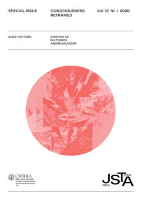
Journal of Science and Technology of the Arts
Fostering Collaborative Insights Across Disciplines.The Journal of Science and Technology of the Arts, published by UNIV CATOLICA PORTUGUESA, is a pioneering open access journal dedicated to the interrelation of the arts and scientific advancements. Since its inception in 2009, it has served as a critical platform for disseminating innovative research across various disciplines, including Visual Arts, Performing Arts, Music, and Conservation. With its ISSN 1646-9798 and E-ISSN 2183-0088, the journal operates from Portugal, attracting a diverse international audience. Although it is currently ranked in Q4 for Arts and Humanities (miscellaneous) and Computer Science Applications, it has achieved notable Q3 rankings in Conservation, Music, and Visual Arts and Performing Arts as of 2023. The journal's impact is reflected in its Scopus rankings, which place it in the midst of its peers, showcasing its growing influence. Through its commitment to fostering interdisciplinary dialogue, the Journal of Science and Technology of the Arts is essential for researchers, professionals, and students interested in the innovative integration of arts and technology.
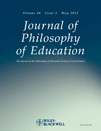
JOURNAL OF PHILOSOPHY OF EDUCATION
Challenging Conventional Wisdom in Education.JOURNAL OF PHILOSOPHY OF EDUCATION, published by Oxford University Press, serves as a premier platform for interdisciplinary research at the intersection of education, history, and philosophy. Established in 1967, this journal has consistently contributed to the academic discourse by publishing insightful articles that challenge conventional thinking and inspire innovative pedagogical practices. With a distinguished ranking in the top quartiles of History and Philosophy and a respectable Q3 position in Education, it occupies a significant niche in the scholarly community. The journal's high Scopus rankings signify its impact, being placed in the 94th percentile for History and the 86th percentile for Philosophy. It welcomes contributions that explore theoretical frameworks, historical contexts, and practical implications of philosophical inquiries into education. Although it does not currently offer Open Access options, the journal remains a vital resource for academics and practitioners seeking to deepen their understanding of educational philosophy. With contributions expected to continue until 2024, the JOURNAL OF PHILOSOPHY OF EDUCATION is poised to remain a crucial avenue for advancing educational thought and research.

STUDIES IN PHILOSOPHY AND EDUCATION
Exploring the Nexus of Thought and LearningSTUDIES IN PHILOSOPHY AND EDUCATION, a reputable journal published by Springer, is nestled in the dynamic intersection of philosophical inquiry and educational theory. With an ISSN of 0039-3746 and an E-ISSN of 1573-191X, this journal has been a significant platform for scholarly discourse since its inception in 1960. Located in the Netherlands, its impressive standing is reflected in its 2023 Scopus rankings, positioned in the Q1 category for Philosophy and Q2 in Education, alongside a commendable 90th percentile in the field of Arts and Humanities. Dedicated to fostering innovative thought and contributing to the evolving landscape of education and philosophy, the journal encourages submissions that explore diverse theoretical frameworks and practical applications. Although not an open-access publication, it remains an essential resource for academics, educators, and researchers aiming to deepen their understanding of the philosophical underpinnings of education. Engage with cutting-edge research and critical analyses that shape the future of educational practices and philosophical thought.